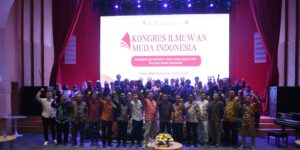
Lecturer at the Faculty of Engineering, Universitas Indonesia (FTUI), Dr. Dipl. -Ing. Nuraziz Handika S.T., M.T. M.Sc., was selected as one of the scientists involved in Kongres Ilmuwan Muda Indonesia (KIMI) 2022 (Young Indonesian Scientists Congress). Nuraziz or Aziz is a lecturer and researcher at Civil Engineering Study Program FTUI who is an expert in the field of structural engineering, especially in experiments and modeling of the fracture mechanics of structures and materials. He earned his doctoral degree from INSA Toulouse, France, and is a member of the Road Tunnel and Bridge Safety Commission (KKJTJ) of the Ministry of National Development Planning, which is a group of bridge experts from various elements assigned to evaluating the safety of bridges and tunnels so that they meet applicable standards.
Aziz’s involvement in KIMI began when he was selected as one of the scientists who successfully passed the Science Leadership Collaborative (SLC) selection, which is a leadership development program for researchers initiated by The Conversation Indonesia. This achievement made Aziz considered one of Indonesia’s potential scientists. Furthermore, he was invited to attend the congress with 18 other SLC participants. At the congress, the young scientists who attended the event discussed several topics based on their respective research clusters. Aziz joined the group of young scientists from the Materials and Computational Science cluster.
The research he has carried out is about mechanical properties and collapse of alternative materials, such as aggregates made from palm shells, recycled aggregates, and other by-products from industries for alternative materials in the construction sector.

In the congress with the theme “Strengthening the Future Architecture Science with Young Indonesian Scientists”, there were also well-known Indonesian scientists such as Prof. Satryo Brodjonegoro, Prof. Sangkot Marzuki, and Dr. Eng. Ilham Habibie. The Indonesian Young Academy of Science (ALMI) as the organizer of the congress welcomed young scientists from various fields of study, institutions, and regions this weekend.
“As one of the SLC participants, a training organized by The Conversation Indonesia, I had the opportunity to participate in KIMI December 3-4 2022,” said Aziz. He mentioned that on the first day of congress activities, the Chairman of the Indonesian Academy of Sciences (AIPI), also a member of the Engineering Sciences Commission, Prof. Satryo Soemantri Brodjonegoro, was present as the keynote speaker who gave a speech entitled “Benefits of Science for Society”.
Prof. Satryo invited young scientists to open the wider community’s horizons about science (scientific literacy) by looking at its impact, benefits, development, and role in life. “Departing from basic research to the downstream industry, technological development is one of the benefits of science which is currently growing exponentially. The benefits of science are definitely felt in the era of the Covid-19 pandemic. It can be seen that the formulation of government policies requires input from science,” said Prof. Satryo.
In the afternoon session, with the theme “Strengthening the Future Architecture Science with Young Indonesian Scientists”, the young scientists who attended the event held discussions based on their research clusters. “I am part of the Materials and Computational Science cluster. The discussion is based on a book published by AIPI entitled ‘Sains45 Agenda Ilmu Pengetahuan Indonesia Menyongsong Satu Abad Kemerdekaan’. The key points from the discussion will be integrated into this book as a form of contextualization and strengthening of the vision of science in Indonesia 2045. There are many potential natural resources in Indonesia that we need to realize so that we can use them wisely for future survival,” said Aziz, who teaches a specialization in structure, particularly in experiments and numerical modeling of damage mechanics, cracks, and material resistance.
After the congress took place, Aziz continued to attend Science Leadership Collaborative Network Gathering (4/12) with 21 other scientists. This activity was led by Beth Macdonald, Louie Angsico, and Sahala Harahap. The three of them are leadership development experts from the United States, the Philippines, and Indonesia who will help participants develop their potential to lead and create impact.
“It is an honor for me to be able to participate in this SLC program. Many lessons were learned, such as awareness of conditions and the surrounding environment, warm data sessions, fluid mind practice, and so on. The interesting thing learned is how to practice some of these ways of thinking and solving problems in real life. Well, in the end, we need to believe in our instincts. Instinct is honed with time and experience. That’s where experience becomes the best teacher for everyone,” said Aziz.
Meeting other SLC participants offline after several months of meeting online, Aziz said that it was a moment to get to know each other better. At the SLC Network Gathering, researchers from various fields were present, including health, social science, law, engineering, natural sciences, IT, and economics. With various work backgrounds such as doctoral students, post-doctoral students, lecturers, researchers, heads of departments, deans, deputy deans, CEO/CTO start-ups, Non-Governmental Organizations (NGOs), public and private sectors, the SLC participants enlivened the gathering atmosphere at that Sunday. Hopefully, future collaborations can be done or initiated from this activity.
Dean of FTUI Prof. Dr. Heri Hermansyah, ST., M.Eng., IPU expressed his pride for Aziz’s achievements. “In the future, how we find solutions and answer so many of the nation’s problems cannot be done only by one party. Collaboration from various parties is needed, starting from researchers and lecturers in universities, the industrial sector, government, NGOs, and many more. Hopefully, Aziz, through his involvement in SLC, will be able to bridge the innovations that exist in FTUI and the future needs of the industry and society.”



